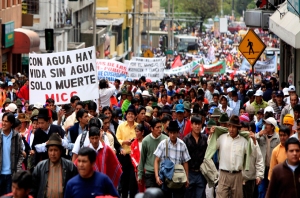
William I. Robinson writes at Al Jazeera on the subject of the Pink Tide–“the ambiguous turn to the left in recent years in several Latin American countries”:
The Pink Tide governments have been “leftist” insofar as they have introduced limited wealth redistribution, restored a minimal role for the state in regulating accumulation, and administered government expansion in more inclusionary ways. When we cut through the rhetoric, however, a number of these governments – such as the Socialists in Chile, Kirchner in Argentina, and Lula in Brazil – were able to push forward capitalist globalisation with greater credibility than their orthodox neo-liberal predecessors, and, in doing so, to deradicalise dissent and demobilise social movements. What emerged was an elected progressive bloc in the region committed to mild redistributive programmes respectful of prevailing property relations and unwilling or simply unable to challenge the global capitalist order – a new, post-neo-liberal form of the national state tied to the larger institutional networks of global capitalism.
In many Pink Tide countries there has been no significant change in the unequal distribution of income or wealth, and indeed, inequality may actually be increasing. Nor has there been any shift in basic property and class relations despite changes in political blocs, despite discourse favouring the popular classes, and despite mildly reformist or social welfare measures. In Argentina, for instance, the percentage of national income going to labour (through wages) and to the unemployed and pensioners (through social welfare subsidies and pensions) dropped from 32.5 per cent in 2001, before the crisis exploded, to 26.7 per cent in 2005. In Kirchner’s own words, the aim of his policies was to reconstruct capitalism in the country, “a capitalism in which the state plays an intelligent role, regulating, controlling, and mitigating where necessary problems that the market does not solve”. Despite its social programmes, the Kirchner administration worked to demobilise and divide Argentina’s social movements.
Continue reading “Latin America’s left at the crossroads”


